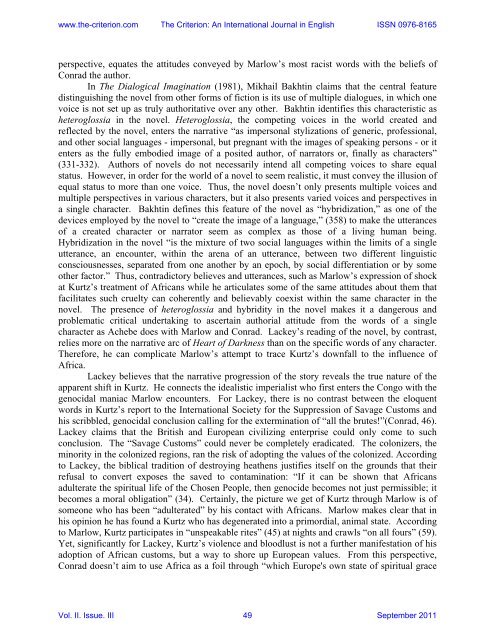Vol. II. Issue. III September 2011 - The Criterion: An International ...
Vol. II. Issue. III September 2011 - The Criterion: An International ...
Vol. II. Issue. III September 2011 - The Criterion: An International ...
Create successful ePaper yourself
Turn your PDF publications into a flip-book with our unique Google optimized e-Paper software.
www.the-criterion.com <strong>The</strong> <strong>Criterion</strong>: <strong>An</strong> <strong>International</strong> Journal in English ISSN 0976-8165<br />
perspective, equates the attitudes conveyed by Marlow’s most racist words with the beliefs of<br />
Conrad the author.<br />
In <strong>The</strong> Dialogical Imagination (1981), Mikhail Bakhtin claims that the central feature<br />
distinguishing the novel from other forms of fiction is its use of multiple dialogues, in which one<br />
voice is not set up as truly authoritative over any other. Bakhtin identifies this characteristic as<br />
heteroglossia in the novel. Heteroglossia, the competing voices in the world created and<br />
reflected by the novel, enters the narrative “as impersonal stylizations of generic, professional,<br />
and other social languages - impersonal, but pregnant with the images of speaking persons - or it<br />
enters as the fully embodied image of a posited author, of narrators or, finally as characters”<br />
(331-332). Authors of novels do not necessarily intend all competing voices to share equal<br />
status. However, in order for the world of a novel to seem realistic, it must convey the illusion of<br />
equal status to more than one voice. Thus, the novel doesn’t only presents multiple voices and<br />
multiple perspectives in various characters, but it also presents varied voices and perspectives in<br />
a single character. Bakhtin defines this feature of the novel as “hybridization,” as one of the<br />
devices employed by the novel to “create the image of a language,” (358) to make the utterances<br />
of a created character or narrator seem as complex as those of a living human being.<br />
Hybridization in the novel “is the mixture of two social languages within the limits of a single<br />
utterance, an encounter, within the arena of an utterance, between two different linguistic<br />
consciousnesses, separated from one another by an epoch, by social differentiation or by some<br />
other factor.” Thus, contradictory believes and utterances, such as Marlow’s expression of shock<br />
at Kurtz’s treatment of Africans while he articulates some of the same attitudes about them that<br />
facilitates such cruelty can coherently and believably coexist within the same character in the<br />
novel. <strong>The</strong> presence of heteroglossia and hybridity in the novel makes it a dangerous and<br />
problematic critical undertaking to ascertain authorial attitude from the words of a single<br />
character as Achebe does with Marlow and Conrad. Lackey’s reading of the novel, by contrast,<br />
relies more on the narrative arc of Heart of Darkness than on the specific words of any character.<br />
<strong>The</strong>refore, he can complicate Marlow’s attempt to trace Kurtz’s downfall to the influence of<br />
Africa.<br />
Lackey believes that the narrative progression of the story reveals the true nature of the<br />
apparent shift in Kurtz. He connects the idealistic imperialist who first enters the Congo with the<br />
genocidal maniac Marlow encounters. For Lackey, there is no contrast between the eloquent<br />
words in Kurtz’s report to the <strong>International</strong> Society for the Suppression of Savage Customs and<br />
his scribbled, genocidal conclusion calling for the extermination of “all the brutes!”(Conrad, 46).<br />
Lackey claims that the British and European civilizing enterprise could only come to such<br />
conclusion. <strong>The</strong> “Savage Customs” could never be completely eradicated. <strong>The</strong> colonizers, the<br />
minority in the colonized regions, ran the risk of adopting the values of the colonized. According<br />
to Lackey, the biblical tradition of destroying heathens justifies itself on the grounds that their<br />
refusal to convert exposes the saved to contamination: “If it can be shown that Africans<br />
adulterate the spiritual life of the Chosen People, then genocide becomes not just permissible; it<br />
becomes a moral obligation” (34). Certainly, the picture we get of Kurtz through Marlow is of<br />
someone who has been “adulterated” by his contact with Africans. Marlow makes clear that in<br />
his opinion he has found a Kurtz who has degenerated into a primordial, animal state. According<br />
to Marlow, Kurtz participates in “unspeakable rites” (45) at nights and crawls “on all fours” (59).<br />
Yet, significantly for Lackey, Kurtz’s violence and bloodlust is not a further manifestation of his<br />
adoption of African customs, but a way to shore up European values. From this perspective,<br />
Conrad doesn’t aim to use Africa as a foil through “which Europe's own state of spiritual grace<br />
<strong>Vol</strong>. <strong>II</strong>. <strong>Issue</strong>. <strong>II</strong>I 49 <strong>September</strong> <strong>2011</strong>
















